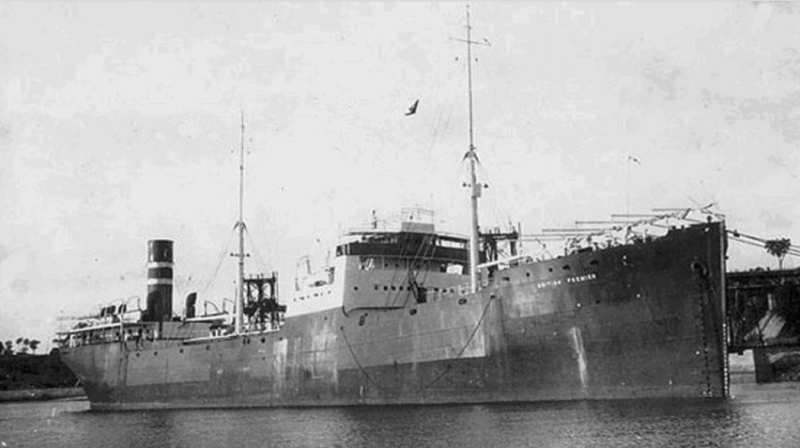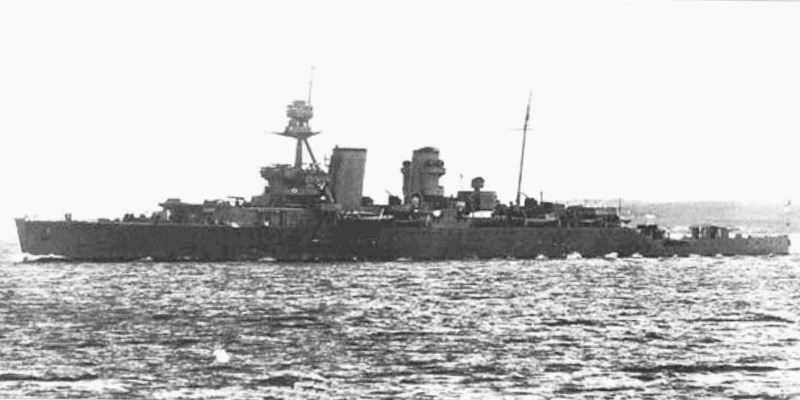The Loss of the ss British Premier
December 24th 1940

On December 22nd 1940 the British Premier joined convoy SLS 60 at Freetown after previously loading 8,000t of crude oil at Abadan in the Persian Gulf, bound for Swansea. She soon became a straggler from the convoy because of her lack of speed, thus adding to her vulnerability from attack.
At 1641h on December 24th 1940 when approximately 200 mile southwest of Freetown the British Premier was hit by two torpedoes fired from U65 and the vessel exploded immediately. One lifeboat managed to get away carrying 9 survivors and these were picked up H.M.S. Hawkins on January 3rd 1941
Four other crew members, who had just joined the 4-8 watch managed to reach the forecastle head of the blazing vessel and after enduring the fierce heat coming from the blazing fuel tanks they jumped overboard and swam to windward clear of the burning oil on the water.
These four crew members were Evan Basil Davies, of Monton Terrace, Danygraig, Swansea, Walter Russ, of Danygraig Road, Danygraig, Swansea, Robert Austin of Filstead Crescent, Sunderland and Evan Owen Griffiths of Malogna House Llandyssul Cardiganshire.
The Master, 30 crew members and 1 DEMS gunner were lost.
From The South Wales Evening Post Friday May 16th 1941:
“SWANSEA MEN’S 41 DAYS IN OPEN BOAT”
“TANKERS SURVIVORS’ LONG ORDEAL; SEAGULL MEAL”
SHIP IN FLAMES
A violent explosion took place, and on reaching the forecastle door they saw that the whole of the side of the ship was in flames and the deck split.
As they were unable to get out of the door, they all climbed over the partition between the forecastles, out of the port door and up on the forecastle head. The wind was on the port bow, about force 3.
The oil on the water around the vessel was burning fiercely, and heat from the burning tanks of crude oil was unbearable.
As the vessel had practically lost all way, the four men jumped overboard and swam to windward clear of the burning oil on the water.
SWIMMING THREE HOURS
Davies and Russ think they were swimming around for about three hours. All four kept together clear of the flames and watched the burning ship.
Apparently the vessel, when stopped, kept her position in relation to the wind. The port or weather side was fairly clear of fire, but huge flames and smoke were belching to leeward.
MENACED BY FLAMES
After about three hours in the water all four men drifted in towards and under the port quarter. A lifeboat ladder was hanging over the side, and Griffiths up onto the boatdeck.
The davits of the port after lifeboat, which had been secured outboard before the explosion, were empty, the port after dinghy was in the chocks and undamaged. Griffiths tried to lift the boat to swing it unaided, but found this too heavy for him.
Flames were getting nearer him, and at any moment the burning oil might spread to the port quarter where his shipmates were hanging on to the ladder, practically exhausted.
He was in a desperate plight, and in order to lighten the boat he lifted the water breaker, mast, sails, boat hook and oars out of the boat and flung them over the side.
DRIFTED INTO FLAMES
The water breaker, of course, sank and unfortunately, mast, sails, oars etc., drifted into the flames and were burnt.
A few seconds after the gear had been flung overboard Russ managed to climb on board. He and Griffiths rapidly lowered the boat and after picking up Austin and Davies, got the boat clear of the flames, using the bottom boards and paddles.
....When about a mile away from the ship – it was dark by this time – they put the sea anchor out and the boat maintained this position throughout the night. The submarine was sighted but did not approach the boat
TANKER SANK
By about 10a.m. the next day the tanker sank; there was no sign of the other party that had apparently got away in the port lifeboat.
All four men were clad only in sleeveless vest and short underpants; trousers, boots etc., had been thrown off while swimming away from the ship.
On taking stock of the contents of the boat, they found a compass, sea anchor and line, lamp (smashed), bread tank (full), two tins of flares, one axe, bucket, two bailers, boat-cover and painter.
A sort of mast was made from the bottom boards and on this a sail was rigged from the boat-cover. They tried to make a north-easterly course by compass, but as the wind was northerly, little or no headway was made.
SUBMARINE SEEN AGAIN
On the third night the submarine was seen on the surface, close to the boat – it was apparently the same submarine that had sunk the ship, but the nationality could not be discerned.
At first the men thought of hailing her and asking for water, but after consulting together they decided to keep quiet and the submarine passed out of sight.
The weather was fairly good throughout and according to Davies and Russ there was never at any time the danger of the unmanageable boat being swamped.
SAVED BY RAIN
The ill-clad men were very hungry, but they could hardly eat the biscuits owing to having no water whatever to quench their severe thirst.
The men had no water to drink until the eleventh day, when heavy rain fell, and all available receptacles were soon filled.
They tried their hand at catching small fish in the sea anchor but the fish were so small and difficult to catch that they gave it up.
For days sharks were hovering around alongside the boat.
SEAGULL EATEN
On the thirty-first day the biscuits gave out, but rain showers were frequent.
An exhausted seagull settled on the forepart of the boat. This was soon killed, plucked and eaten, but as it was so small when plucked, it did not help much.
On the forty first day the very exhausted men, suffering badly from salt water boils and sores, were picked up by a destroyer.
Four steamers were sighted by the survivors at various dates during daylight, but were too far off to see any signals from the boat.